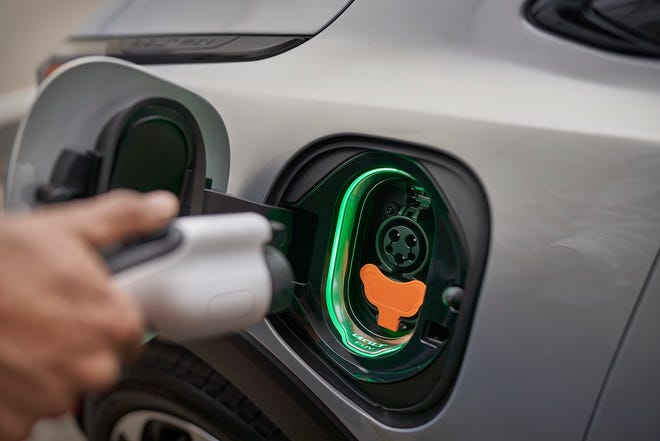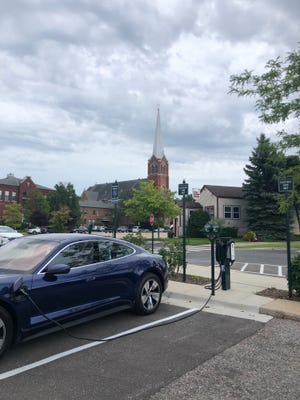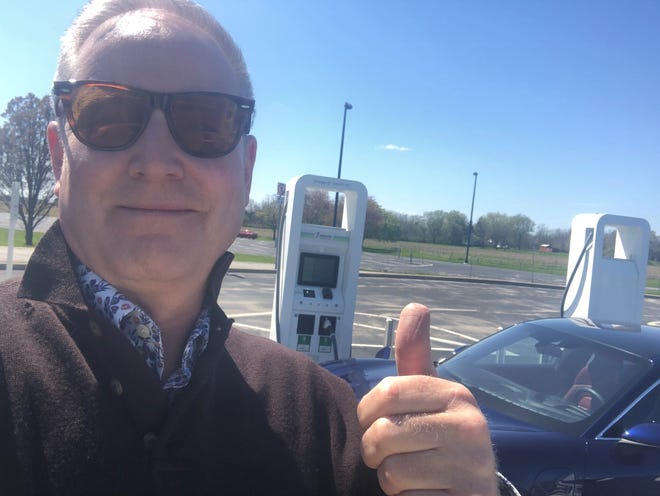Last year, Patrick Anderson went electric: He got a Porsche Taycan EV in dark blue.
Anderson, who is CEO of East Lansing-based economic consulting firm Anderson Economic Group, loves the zippy acceleration and “exciting” features the car offers. He also gets satisfaction in knowing that driving an EV benefits the environment, he said.
But Anderson’s joy comes with a dark side.

“They are a wonderful driving experience. But at the same time, they’re an enormous burden in time and in energy in finding chargers and getting them charged,” Anderson said. “And you’re not really saving much in terms of charging costs … you may be paying more.”
Costs to drive an EV compared with a gasoline car are detailed in a report Anderson Economic released Thursday called “Comparison: Real World Cost of Fueling EVs and ICE Vehicles.”
The study has four major findings:
- There are four additional costs to powering EVs beyond electricity: cost of a home charger, commercial charging, the EV tax and “deadhead” miles.
- For now, EVs cost more to power than gasoline costs to fuel an internal combustion car that gets reasonable gas mileage.
- Charging costs vary more widely than gasoline prices.
- There are significant time costs to finding reliable public chargers — even then a charger could take 30 minutes to go from 20% to an 80% charge.
It is the first of a series of reports Anderson Economic Group will release. It started the project — an independent report — more than six months ago.

Anderson has worked with the auto industry for 20 years and given the industry’s transition to EVs, the group decided to do the studies to assess the likelihood consumer will adopt the cars.
General Motors and Ford Motor Co. are banking on such a switch. Both are investing tens of billions of dollars to go all-electric in the next two decades. GM has promised to double its revenues largely on the backs of new EVs.
“Part of the strength of the analysis is we’re showing the real-world costs that EV drivers face,” Anderson said. “You typically have to go to a commercial charger and commercial charger rates are two, three or four times that of residential charger rates.”
Then, there is the time to drive around to find a commercial charger, time that Anderson dubs “deadhead miles.” Even charging at home on a Level 1 or Level 2 charger is time consuming and expensive.
The study found that the average cost of a Level 1 charger is $600. To install a Level 2 costs $1,600 because it requires hiring an electrician. An L1 charger uses a 120-volt supply of electricity and can take 20 or more hours to charge, whereas an L2 chargers uses 240 volts and can charge in a few hours.
Real cost to charge up
Anderson’s report considers four costs beyond the cost of residential electricity when calculating how much it costs to drive an EV:
- Cost of the residential charger
- Cost of commercial electricity
- An annual EV tax, which in Michigan ranges from $135 to $235, depending on the vehicle model. This is to make up for not paying a gas tax
- Deadhead miles to get to a fast charger
Given all of that, the conclusion is EVs cost more to “fuel” than gasoline cars that get reasonable gas mileage, Anderson said. It all depends on how the car is used and how much commercial charging is involved.

A mid-priced internal combustion car that gets 33 miles per gallon would cost $8.58 in overall costs to drive 100 miles at $2.81 a gallon, the study found. But a mid-priced EV, such as Chevrolet Bolt, Nissan Leaf or a Tesla Model 3, would cost $12.95 to drive 100 miles in terms of costs that include recharging the vehicle using mostly a commercial charger.
On a yearly basis, assuming the mid-priced cars traveled 12,000 miles, it would cost $1,030 to drive an internal combustion car and $1,554 to drive an EV.
For luxury cars that get 26 miles per gallon and using premium gas at $3.25 a gallon, the cost to drive an internal combustion car 100 miles is $12.60. The cost to drive a luxury EV, such as a Taycan, Tesla Model S or X or Jaguar I-Pace, is $15.52 to travel 100 miles. That is using mostly commercial chargers.
“That’s apples to apples and includes the extra EV taxes, the commercial charging and the home charging and the allowance of driving to a gas station, which, for most Americans, is very short compared to driving to a commercial charger for an EV owner,” Anderson said.
The study differs from some reports that show it’s cheaper to drive an
EV than a conventional car. For example, a 2018 study from the University of Michigan’s Transportation Research Institute found the average cost to operate an EV in the U.S. was $485 per year compared with a gasoline-powered vehicle at $1,117. Anderson said most studies include only the cost of residential electricity and don’t factor in the four other costs that this study does.
Still, he noted there are environmental benefits to EV ownership and costs could come down if there are more reliable commercial charging centers built. Electric cars also require less costly maintenance than gasoline-powered vehicles.
“Our research is consistent with what President Joe Biden and the Detroit Three have said, which is, a choke point for a number of consumers is the lack of infrastructure,” Anderson said. “My own experience with an EV is that the biggest challenge is getting them charged so that it’s something you can use on a daily basis.”
Beyond range anxiety
Charging costs vary much more for EVs than gasoline prices, too, by 100% or more from month-to-month or week-to-week, Anderson said.
“Even if you drive to the most expensive gas station, your varying price won’t be as great as that,” he said.
The rates for commercial chargers around Michigan range from 31 cents per kilowatt hour to 66 cents per kilowatt hour. The Michigan resident price is 17 cents per kilowatt hour.

“That’s going to be a big surprise to a lot of drivers,” Anderson said, adding that many commercial chargers will also require the EV driver to enroll and sometimes pay a $20 fee, but that might be reimbursed with charging.
Also, don’t plan on ever having a 100% charge on your EV, he said.
“It’s very difficult to charge it up to 100%,” Anderson said. “The chargers slow down and the manufacturers warn you not to do it because there is additional burden on the battery system when you get your vehicle above a 90% charge.”
More:Ford Maverick hybrid pickup locks down 42 mpg in the city
More:GMC expects record Sierra pickup sales as it struggles to keep up with demand
That means if the vehicle advertises a range of 240 miles on a full charge, a driver in reality will get considerably less on, say, an 80% charge, he said. That means a trip Up North could require a few stops at charging stations that can provide an 80% charge in 30 minutes.
For new EV drivers these costs, time constraints and other considerations are often a surprise, Anderson said.
“Unlike their reliable gas cars that have 300 or 400 miles of range that can be filled up at a number of gas stations in our country, you have to think about what available chargers you have and plan it out,” Anderson said. “It’s more than range anxiety, it’s a burden of constantly monitoring the charging status.”
The Anderson report lists about two dozen sources in its research, which relied on consumer experiences and costs for drivers that go beyond government data on fuel economy and electricity prices. Anderson said it did stopwatch measurements of the time required to refuel gasoline cars and EVs, recorded customer experiences on reliability of chargers, charging time and costs. It used consumer reports from actual EV drivers, including those posted on forums for Taycan and Tesla drivers, Reddit and applications serving EV drivers such as PlugShare and ChargePoint.
Contact Jamie L. LaReau: 313-222-2149 or [email protected]. Follow her on Twitter @jlareauan. Read more on General Motors and sign up for our autos newsletter. Become a subscriber.






